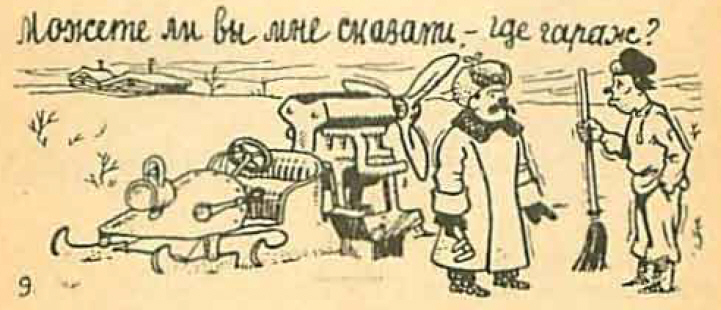| Russian for English speakers 09 |
 |
| Lesson 09 |
|
Russian |
Pronunciation & Comments |
English Английский |
|
|
20 - двадцать |
20 - (dvadcăt') |
twenty | |
|
21 - двадцать один |
21 - (dvadcăt' odin) |
twenty one | |
|
22 - двадцать два |
22 - (dvadcăt' dva) |
twenty two | |
|
23 - двадцать три |
23 - (dvadcăt' tri) |
twenty three | |
|
Девятый (9-й) урок |
(dev'atiy urok) |
Ninth lesson |
|
|
УРОК НОМЕР ДЕВЯТЬ (№9) |
(oorock nommĕr dev'at') |
Lesson number nine (#9) |
|
| У меня есть работа (1) |
I have work [for me there-is work] |
||
|
AK: This means "I have a job to do" or "I have some work to
do". |
|||
| 1 | Вы всегда много работаете? | (do) you work always much [always much work]? | |
|
Вы всегда так много работаете? |
AK: This means "Do you always work so much?" |
||
| 2 | Да; нужно. |
Yes ; I must (or I have to) [(it is) necessary]. |
|
|
Да, так надо. |
AK: This means "Yes, it must be so". |
||
| 3 |
Ваш брат Ваня сегодня у меня обедает; |
Your brother Vania dines to day with me | |
|
AK: "Your brother Vania today eats at my place (on/at
mine)", |
|||
| 4 | если вы можете тоже...(2) | if you can also... | |
|
|
AK: What we have here, is some kind of
peasant-with-landlord talk, with neuter suggestions. |
||
| если вы хотите, тоже приходите | "if you (pl.) like, come (to me) also." | ||
| 5 | Конечно могу; спасибо; | Certainly I can; thank-you; | |
| 6 | сыр..., хлеб..., молоко... и мне довольно. | cheese..., bread..., milk.., | |
| and for me (it is) enough. | |||
|
AK: Once again, the phrases are correct by themselves,
|
|||
| и мне будет достаточно. | You can use also "And for me will be enough'. | ||
| 7 | У вас есть (3) интересный журнал; | You have (for-you there-Is] (an) interesting magazine; | |
| 8 | могу-ли (4) я его читать? | may I read it? | |
|
AK: читать
- "to read" - is an "basic" infinitive without prefix.
|
|||
|
Могу ли я это почитать? |
"Can I read it?' |
||
| почитать -
"to read along" or 'to read by" - describes process of reading, and it's prefixed to create more colloquial version of "to read". |
|||
| 9 | Пожалуйста, читайте; у меня сейчас (5) ещё есть работа. |
I pray you, read it. |
|
|
AK: "Пожалуйста, читайте" means "Please, read" or "Please, be reading" |
|||
| 10 | я работаю; вы работаете; он работает; работа. |
I work; you (pl.) work; he works; work (job). |
|
| 11 | я могу; вы можете; он может; можно (6) | I can; you can; he can; one can [(it is) possible]. | |
| 12 | Я обедаю; вы обедаете; он обедает; обедать. | I dine; you dine; he dines; to dine. | |
| 13 | конечно; довольно; сыр; хлеб; молоко. | Certainly; enough; cheese; bread; milk. | |
|
AK: enough = достаточно |
|||
|
УПРАЖНЕНИЕ |
(oopra(d)jniĕniĕ) |
EXERCISE. | |
| 1 | Можете ли вы мне сказать, где есть гараж? |
Can you tell me where there is a garage? |
|
| Можете ли вы мне сказать, где тут гараж? | Compare: "Can you tell me where here is a garage? " |
||
| 2 | Когда вы обедаете? | When (do) you dine? | |
| 3 |
Она работает довольно хорошо. |
She works well enough [enough well]. | |
|
AK: довольно (хорошо) - rather, pretty, fairly (well) |
|||
| Она работает достаточно хорошо. |
Compare: |
||
| 4 | Что вам нужно? |
What do you need [to-you (is) necessary]? |
|
| - Мне ничего не нужно. | I do not need anything [to-me nothing (is) not necessary]. | ||
| 5 | Читаете это ещё раз. | Read this once again [again once]. | |
|
Прочитайте это ещё раз. |
AK: "Read this one more time" is more colloquial. | ||
| 6 | Конечно, я могу вам помогать. | Certainly I can help you. | |
|
AK: я могу вам помогать means "I can be helping you". |
|||
| Конечно, я могу вам помочь. |
Compare: |
||
| 7 | Ваш друг может быть болен. | Your friend (is) may-be ill. | |
|
может быть болен
can sound like some kind of permission, "he can be ill".
|
|||
|
Ваш друг, возможно, болен. |
Compare: "Your friend is, possibly, ill." |
| NOTES. |
AK-NOTE |
|
| 1 |
I have is generally expressed by: for me there-is
: у меня есть;
|
у вас есть
is "you have", word by word : "on/at you be/is". |
| 2 |
In можете, we recognize the "мож" in можно, which we saw in lesson 8. |
|
| 3 |
У вас есть:
for you there is, or simply
У вас. |
у вас by itself can mean "at your place there is", "at your home there is" |
| 4 | Ли, interrogative particle (see lesson 8, note 2). |
ли - whether, is...? |
| 5 |
Вы читаете,
you read |
|
| 6 |
Note the difference of form in : я могу, вы можете, etc... |
я могу - I can |
